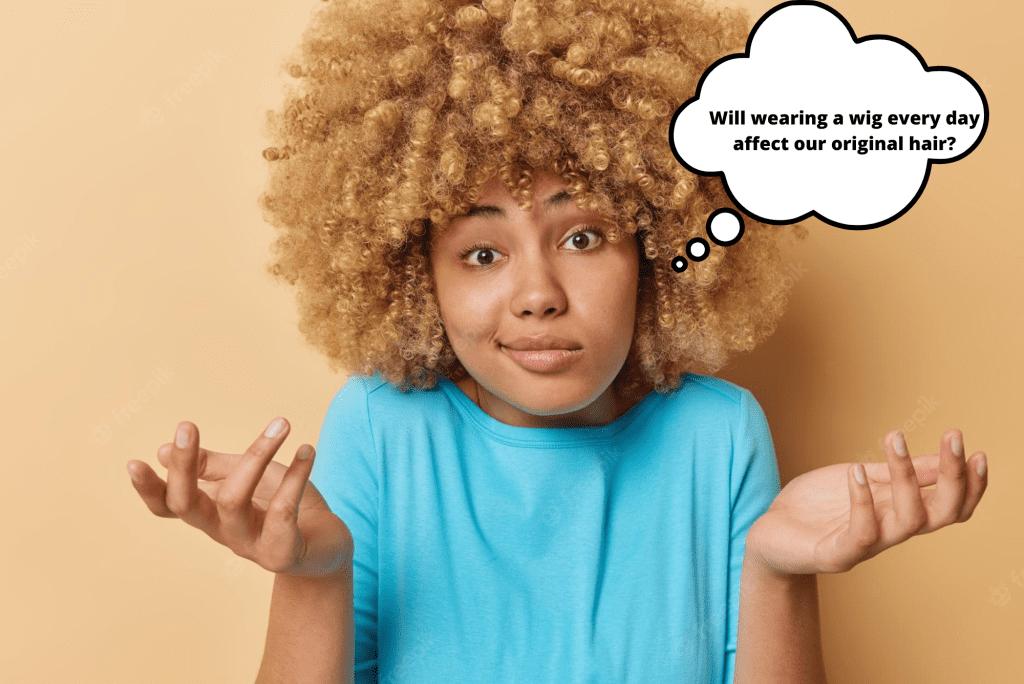Wigs are becoming more popular among people. If you wear wigs frequently, you might be concerned about how it will affect the health of your hair. The question of whether wearing a wig every day will affect our original hair is one that many people have been asking themselves.
Some people believe wearing a wig will make their original hair fall out and become weaker, while others say it won't affect the original hair.
The truth is, wearing a wig every day might not affect your original hair. In this post, we'll thoroughly respond to the question, “Are wigs bad for your hair?” We'll also provide advice on how to keep your hair safe.

Are wigs bad for your hair?
The idea of wearing a wig every day has been around for a while. However, wearing a wig every day is not new to the world. There are many different cultures that have been doing that for centuries. Wearing a wig every day is not just about making a fashion statement. It affects how people perceive you, how you think about yourself, and how other people treat you.
Wigs are typically made of synthetic hair that doesn't require heat styling or an expensive salon visit. This makes it easy for anyone to wear a wig every day without worrying about their hair looking too good or bad.
As well as expressing your individuality, wearing wigs also makes you feel more confident. Wigs are available in different cuts and styles, which means they can be easily styled to look like an old-fashioned style or a new trendy style. In addition, many people choose to dye their hair before getting a wig to have ultimate control over what the final product looks like.
Wearing a wig is also safe and has no adverse health effects on the person wearing it. Wigs are typically made of synthetic fiber, which can be washed with regular shampoo and water. Wigs don't require heat styling or an expensive salon, which makes them easy to maintain. In addition, these wigs don't have any chemicals that could irritate the skin or hair of the person wearing them.
Do Wigs Prevent Hair Growth?
Even though you still have healthy hair, wearing your gorgeous wig is enjoyable. Wigs can, however, stop your natural hair from growing if they are not taken care of properly.

While wearing a wig, follow these seven simple steps to support healthy hair:
1. Regularly wash your hair:
When displaying your gorgeous wig, it's easy to neglect your hair maintenance regimen. The hair could get dry and brittle if you go without washing or hydrating it for a long time. Therefore, this could result in hair thinning and breakage.
Additionally, wearing a wig might make your scalp perspire, especially in the summer, which can hinder hair development. The added heat won't damage your hair if you wash it properly.
Use a mild moisturizing spray rather than a heavy or greasy product if your hair is naturally dry, because adding moisture as part of your hair care routine may result in dampness under your wig. It's preferable to avoid adding additional moisture to naturally greasy hair.
Last but not least, ensure your natural hair is dry before putting on your wig to avoid the formation of unwanted microorganisms, which can impede hair growth.
2. Increase Scalp Tension:
You should take care of your hair while wearing a wig by washing and hydrating it as needed. If you braid your hair underneath your wig, it might help.
Your scalp may experience stress and tension from these braids if they are excessively tight. In addition to pulling your hairline and causing hair breakage, the tight braids can make it challenging to wear a wig. To minimize friction between your wig and natural hair, it is advisable to keep the braids loose.
3. Choose the Correct Wig Size
There are various sizes available for wigs. They fall into three categories: large, average, and trim. A professional will be able to measure your head before you buy. Suppose you wear a wig that is too small and too tight. In that case, it will be challenging to experience the extra confidence of wearing your magical wig because it will be uncomfortable and cause hair loss or breakage around the head's perimeter.
4. Select the Appropriate Cap Design
While choosing a wig cap that fits well and complements your hair type won't immediately result in hair breakage or loss, doing so is still essential.
As an illustration, it could irritate your scalp if you are too hot while wearing your wig. To allow your hair to breathe in this situation, it is advisable to choose capless wigs. With the latter, airflow to your scalp is improved and it’s lightweight. On the other hand, because they lack wefts at the back and sides, conventional wigs cause your head to become quite warm. So it is important to pick the right cap construction.
5. Remind Yourself to Bring a Wig Cap
Putting on a wig cap is advised. Wig caps are a fantastic option for additional protection between your hair and wig. Creating a smooth surface for your wig to look more natural makes it easier to set. Furthermore, the cap reduces friction between your hair and the wig, improving your comfort.
6. Reduce the use of adhesives
As far as possible, try to avoid fashion trends that call for adhesives. Adhesives can damage your hair and lead to hair loss along your hairline if they are misused.
Avoid wearing your wig on top of or next to your hairline on days when you intend to use glue. To protect your hairline, wear the wig in front of it.
Finally, when it's time to take off the wig, under no circumstances pull it; instead, use the remover suggested for that particular glue. Pulling your wig might harm the hair follicles close to your edges, leading to balding.
7. Allow your hair to rest:
It feels like the second part of you now that you've been wearing your wig for two weeks, as we know you are infatuated with it. Additionally, the praises are lovely, but try to occasionally take a vacation from wearing a wig.
Your hair needs a vacation from the tape and glue, and your scalp will have some space to breathe. Taking the wig off before bed is also a good idea because it can pull unnaturally while sleeping and obstruct your scalp's normal blood flow.
Last but not least, wearing wigs has several advantages. It provides a new appearance while giving your hair time to recover from dyes or treatments.
Additionally, properly wearing your wig will only benefit your hair and hairline. It's crucial to select the appropriate wig size and wig cap design. Any error will strain your hairline, and sweating or moisture on the scalp might cause hair loss or breakage.
Finally, just wearing a wig doesn't mean you should ignore your hair. Continue giving it regular washes and moisturizing treatments using the appropriate products for your hair type.
